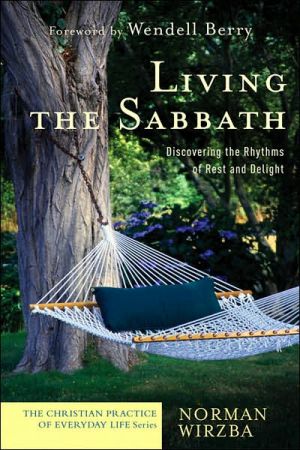

 |

|

The average rating for Living the Sabbath: Discovering the Rhythms of Rest and Delight based on 2 reviews is 2.5 stars.
Review # 1 was written on 2014-12-22 00:00:00 Keith Shaw Keith ShawI don't usually read theology books at all, so this was a stretch for me, but I am really glad I tried it. The first couple of chapters where he focuses on the theology of the sabbath were wonderful. It really made me think about how we do orient our lives around busyness and work, rather than sabbath rest, which is not keeping the sabbath commandment. And the general thinking about how sabbath connects us to the rest of creation and caring for creation - that was great. Lots of good stuff to think about. From there, the book kind of petered out. It got vague and kind of crotchety (he is the editor for Wendell Berry's books so... you can just picture that) with big generalizations like "All computer technologies promote arrogance." Um... you know what else promotes arrogance? Thinking you're too good to use computer technologies. So, those sections were weaker. But the first half was like life-changing and definitely worth reading, and for a work of theology it was quite readable! |
Review # 2 was written on 2018-07-22 00:00:00 Kiko Paris Kiko ParisIt is obnoxious when a book can contain so much utterly true-truth, and yet struggle to communicate that truth in such a manner that conforms to the nature of that truth. I picked up Living the Sabbath with an interest in the author, Norman Wirzba, and the desire to enter more deeply into Sabbath myself. The foreword by Wendell Berry was an utterly delightful perk! But the book itself, at some deep level, lacked the Sabbath-imagination that it so deeply desired to proclaim. Some of this is on the fault of the publishers: will someone please tell the powers-that-be that pushing text out to the utter margins (both vertical and horizontal) just ruins the reading experience? One lugs through paragraph after paragraph of "stretched" text; there was a serious error in publishing here on the end of Brazos Press. Typesetting and publishing errors aside, Wirzba's book presents itself as a practical on-ramp into Sabbath living. Yet, as is too often true of so many "practical" books in our modern, theory-driven world, the practical matters are bogged down by simply more theory, leaving nuggets of life on the sides of the road. In the very last chapter, Wirzba mentions a pastor he knows who has baptismal candidates weed a garden with a mentor: I think a practical study on the Sabbath ought to have dedicated a whole chapter just to all that particular practice entailed, storying it out, analyzing and engaging with it. Better: we could have used a whole chapter on gardening. In other words, Wirzba's book on Sabbath, with its hammock on the cover, doesn't fulfill its own promises and proclamations. It rushes, it zips and zaps. It critiques its late-modern consumerist context, but gives little notice or care to the reality that late-modern consumerism has made this very book possible. Wirzba discusses time and again our inability to receive the Creation as Good, to receive our own lives as gifts, and, yet, we receive so little of his own life and story incarnated in the text (another Sabbath-practice: the art of telling one's story!). I came to Living the Sabbath with a handful of questions. What I received were some smattered (and disorganized) quotes from great authors (Wirzba quotes some of my favorites: Ellen Davis, Wendell Berry, John Yoder), arrayed in a haphazard work of practical theology. For someone with as much professional and academic clout as Wirzba (he's a part of the constellation that makes Duke Seminary a shining star for theological studies), I found this "practical" work stunningly unpractical, and uninspiring. I would not recommend it as a study in Sabbath, preferring instead some of Wirzba's sources (e.g. Christopher J.H. Wright, Ellen F. Davis, etc.) for the academic end, and Wendell Berry (for instance) for the practical. |
CAN'T FIND WHAT YOU'RE LOOKING FOR? CLICK HERE!!!